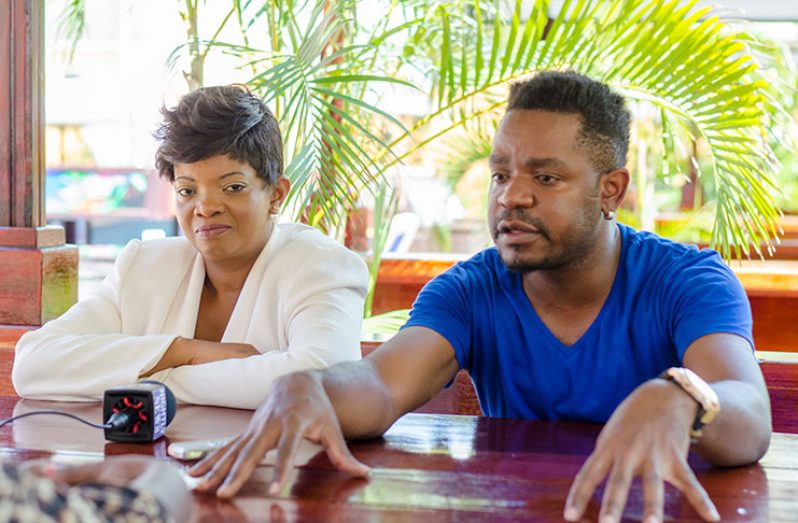–regional advocate decries treatment of sex workers
INSTITUTIONALISED discrimination is one of the many barriers preventing sex workers from accessing HIV prevention tools and education, according to Co-Chair of the Caribbean Sex Workers Coalition, Marlon Taylor.
Taylor spoke to Guyana Chronicle while attending the Caribbean Sex Work Coalition SWIT (Sex Worker Implementation Tool) meeting held at the Tower Hotel recently. That meeting, which attracted approximately 20 sex workers from Jamaica, Guyana, Trinidad and Tobago, Bahamas, Suriname and Antigua, was held with the strong backing of the Pan Caribbean Partnership against HIV & AIDS (PANCAP).
In alluding to the challenges facing sex workers in the Caribbean, Taylor contended that institutionalised discrimination is embraced by Governments that fail to amend legislation that criminalise sex work and the lesbian, gay, bisexual, and transgender (LGBT) community.
“In doing so, what you do is basically send your sex workers’ population under and away from essential services to operate. The systems that exist within countries create their own discrimination,” he explained.
Taylor pointed out that the limited access to condoms in Antigua forces sex workers to wash and reuse condoms; while sex workers and persons within the LGBT community in Trinidad and Tobago who are affected by HIV/AIDS are required to identify themselves as sex workers before having prioritised access to the antiretroviral therapy.
“It is discrimination! It is stigmatizing, and it is distasteful,” the co-chair lamented.
Taylor said it is time Governments amend their laws to include the LGBT community and sex workers, who continue to be sidelined for far too long. “Although the laws against prostitution don’t have teeth or gum to bite, because they are there, it makes it much harder for sex workers,” he said.
SHY AWAY
Taylor said that due to the stigma and discrimination associated with sex work, HIV/AIDS and other sexually transmitted diseases (STDs), many sex workers shy away from accessing medication.
“Because of the stigma and discrimination that is associated with being a sex worker, (they) don’t do sex work within their own area; and so they do sex work away from easy access to health care, easy access to condoms and lubricants. So they go into the interior, they go into other parishes to do sex work; and in these areas where they do sex work, there is no access to any health services whatsoever,” he explained.
He added that the locations of some clinics also pose a barrier. “Here, in Guyana, the treatment site is right at the roadside, and everybody who wants to know everybody’s business can just go to the treatment site and sit in the yard and know who is going for what,” he posited.
The Caribbean Sex Workers Coalition is calling for all-inclusive health centres. “Where I am from, there is an organization — Jamaica Aids Support — that has an all-inclusive clinic; so you come to the doctor for anything, and everybody is seen with the same one, two, three steps, so there is no separation of the services being offered,” he posited.
NET-MAPPING
Meanwhile, PANCAP through its Knowledge for Health (K4Health) Project, has engaged the participants in a ‘net-mapping’ activity to determine how stigma and discrimination affect their ability to advocate for human rights, access to HIV prevention and care, and HIV/AIDS education.
According to Sarah Fohl, Knowledge Management Advisor for the K4Health project, ‘net-mapping is a knowledge management tool that allows participants to determine the relationships, actors, barriers, and opportunities within their communities that significantly affect their lives’.
The Knowledge Management Advisor further explained that the net-mapping exercise allows participants to work together and identify barriers and opportunities to adequately access condoms and education about safe sex and HIV/AIDS.
Knowledge Management Coordinator of the K4Health, Dr. Shanti Singh-Anthony, who also implemented the net-mapping activity, stated: “Sex workers face a tremendous amount of discrimination because of their line of work. It was important for the participants of the workshop to clearly identify what prevents them from gaining sufficient knowledge on HIV/AIDS as well as prevention tools, so that advocates can identify solutions to remove these barriers with the aim of eliminating the spread of AIDS.”
Miriam Edwards, Co-chair and Coordinator of the Caribbean Sex Work Coalition (CSWC), said the exercise was vital for sex workers and leaders of sex worker-led groups to fully understand the importance of their role in reducing discrimination, in order to consistently access HIV/AIDS prevention tools and education.



.jpg)










